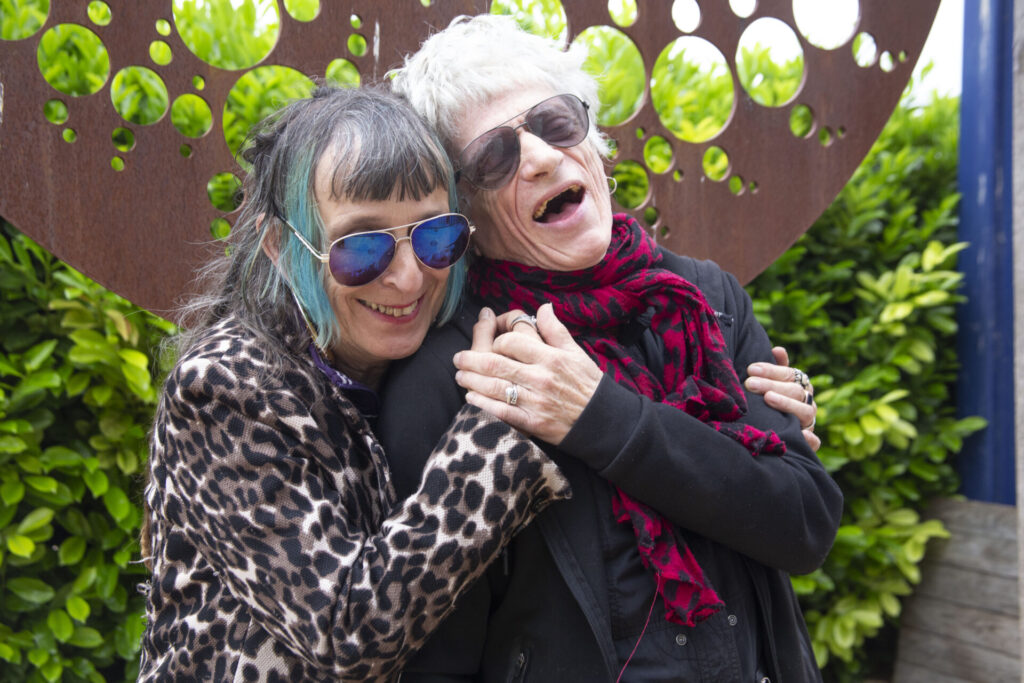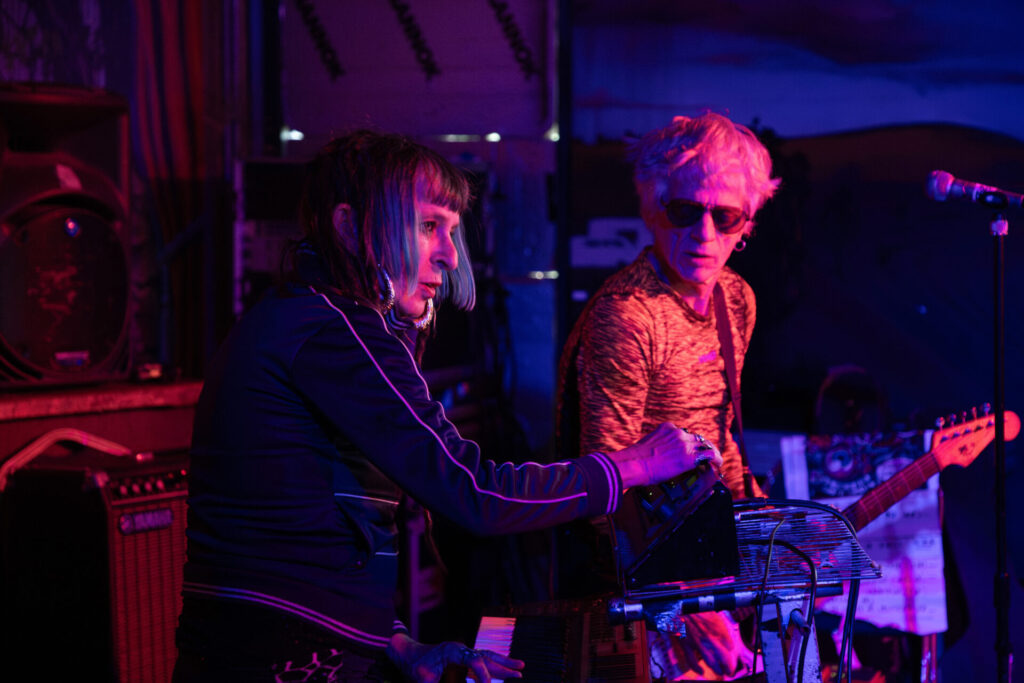Trash Masters: GrRzZz Interviewed
With a combined age somewhere in the region of 130, French couple Pepe and Irene deliver a powerful industrial sound that a band less than half their age would struggle to match. Words: David McKenna. Main portraits: Maria Jefferis
“It isn’t always easy.”
Pepe is half of French duo GrRzZz, who have been touring European squats and intermittently releasing pounding industrial punk albums for the past 25 years. He “plays guitar and screams”, according to the band’s website. His partner, Irène aka Pimpox – who “runs all the electronic stuff” – immediately retorts “You said it first!”
Pepe grins. “But we can deal with it.”
“I think we’re both very passionate about music, and that’s essential for us to keep doing what we do,” Irène continues.
Pepe nods in agreement. “The truth is that if I wasn’t doing this, I’d be dead.” He looks like he means it.
GrRzZz’s blistering set has just taken the roof off the barn stage at The Barge Inn pub in Honey Street, Wiltshire, on the second day of this year’s Acid Horse festival, Irène handling the pulverising beats, coaxing discordant noise from her machines and backing up the vocals while Pepe overlays crunchy riffs and howls and raps through a blizzard of effects. We speak in one of the rooms above the stage, which means that halfway through the interview we have to start raising our voices or else be drowned out by the rumbling bass and dull thuds that shake the floor as the next act gets underway. At the same time, the couple, who tend to finish each other’s sentences anyway, are getting deeper into a bottle of port wine they’ve brought with them, while I tuck into corner shop staple Campo Viejo Rioja. The conversation is lively.
Before becoming a punk, Pepe says he played psychedelic music, “guitars on acid” as he calls it. “A guy I knew taught me the basics: harmony, all that, and after that I played guitar for six hours a day for two years, I had fun doing this sort of jazz-rock stuff but that changed when punk arrived: the Sex Pistols, Richard Hell, Siouxsie, The Damned, wow. All that. I was in my crappy town, Annemasse (near the border with Switzerland), it was really ‘Doom Town’ like The Wipers song. And the first time I heard the Pistols that was it, I left all the technique I had acquired behind me to do really basic stuff. Obviously after that you evolve and find your own way.” He moved to Geneva and was in punk band Technycolor, “which became a Cold Wave, absolutely glacial thing, called Film De Guerre.”

Irène’s path was somewhat different. Her parents were anti-colonialists who moved to Algeria following its declaration of independence from France to help rebuild the newly liberated country. She describes the sight of Archie Shepp, dressed in a djellaba – the loose-fitting robe worn in the Maghreb region – playing in Algiers (which must have been his legendary performance at the first Pan-African Festival in 1969) as a pivotal moment. Then she discovered Monk, and punk. “And I saw the link between the two, the way Thelonius Monk played, that angular style, the attack, and punk music. Later I left all the punk stuff behind for a while and I played jazz, but in the early 80s I was in the Netherlands, playing with friends, stuff that was a bit like early Cabaret Voltaire, I played keyboards that were very ‘eeek eeek eeek’, really piercing.”
One group in particular seems to have set them on their current path. “The first real shock to the system for me in terms of industrial music was Ministry, in the 80s. Those first three or four albums, before it became really metal. There were guitar samples from Slayer, things like that and fuck, that really blew my mind” says Pepe. Irène confirms “I very clearly remember hearing Ministry for the first time. And Atari Teenage Riot”.
“Oh yeah we were super fans,” says Pepe. “We saw them before they became really well known.”
At the time, the nascent group had tried working with drummers but the industrial sounds they were hearing convinced them to go back to basics and work with a drum machine, as they had when they first started playing together “in a basement, but this time we wanted to really figure out how to do it, especially you Irène.”
They started gigging in European squats in “in around 2000” according to Pepe, or “a little earlier” according to Irène, encouraged by their friends in Parisian anarcho-punk group La Fraction, although by then they had already played in several squats around Paris and its suburbs. Irène had also had some contact with the Parisian squat scene in its 80s heyday, when it spawned bands like Bérurier Noir and Mano Negra (the latter were fronted by Manu Chao, now a global star).
“I saw les Bérus (as Bérurier Noir were also known) in Paris playing as part of a fashion show because there were all these young fashion designers on the scene. It was one of their earliest gigs, there was another band playing, Lucrate Milk, and a girl the designers really liked having as a model, Béatrice Dalle. She was the girlfriend of Bérurier Noir’s manager and became really famous later on.”
The connections outside France developed in earnest after they were invited to perform at a festival in Leipzig. “We had just started, for about a year, to be just us with the machines. That was when we started to meet people from the European squat scene,” Irène recalls. They went on to play in the Netherlands, Belgium, Greece, Italy, Norway, Romania, Serbia, Croatia, Poland, even Turkey, “we played a lot,” says Pepe. They also came to London, where they played in a place where there was “water everywhere”. “It was really a crappy squat” (Irène says this in English). “A friend said ‘come to London, I’ll put you on here. But the week before we arrived, they were evicted from the nice place they had and all they could find was this terrible place in Camberwell.”

When I ask about their sonic affinities with techno, I discover that they’ve also played several raves.
Pepe: “We’ve played four or five, some authorised, some illegal. One at 9.30 in the morning. We had slept a bit, we were pretty much the only ones who hadn’t taken drugs. You wake up, and find yourself with a beer in your hand, good morning!”
“The party was organised by a duo called Les Boucles Étranges (key figures in the French free party scene). They were very close to Spiral Tribe, so we met them too,” says Irène. “And we played twice with 69 dB from Spiral Tribe.”
“We definitely absorbed some of that” says Pepe.
“Of course, we must have done,” Irène agrees.

Back to the squats, and the pair bemoan the repressive measures that have led to the closure of so many of the places that they’ve visited, through laws like the ‘antikraak’ legislation in the Netherlands which allows for temporary occupation of unoccupied premises to prevent squatting, as well as the Antideutsche movement that has emerged from the German left and which is as stridently anti-Germany as it is pro-Israel, or what they see as apolitical posturing in alternative spaces elsewhere. For the pair, political engagement is inseparable from their work. Like Irène, Pepe comes from a politically committed family.
“They were all in the Communist Party, and before that there were people who took part in the resistance under the occupation. There was an uncle who was 15 at the time, he was a liaison agent, carrying information between different maquis (small rural resistance groups). I’ve distanced myself a bit from the Communist Party, a lot even, but I still respect activists. I would call myself an anarcho-communist now.”
I barely need to ask for their opinion of Macron. Irène puts it succinctly: “When he arrived, he said that he was neither of the left or the right, but what he forgot to mention is that he is a fascist.”
On stage, you get a feeling for their rage but without the specifics; it reaches you more as an overall sensation. Pepe writes the lyrics by first coming up with what the French call “yaourt” (yoghurt) i.e. producing sounds that could almost be words, and which have the right rhythm. He tends to avoid direct sloganeering and says that he prefers to deal in “metaphors”. The meaning is clear enough, though, in songs like ‘Holiday In Gaza’ (from 2012’s Dans Le Sens Du Poil), a tip of the hat to Dead Kennedys that has also proved to be shockingly prescient. “It’s unbelievable because Trump has started talking about exactly that,” Irène says, in reference to the US president’s stated desire to turn the territory into the “Riviera of the Middle East”. “We wrote that after an attack on Gaza in 2008, 2009 called Operation Cast Lead, when Israel killed over 1000 Palestinians. At the time we thought that was as bad as it could get… we had no idea.”
Their latest album, released in January of this year, is called Commercial Shit, a title Irène came up with and didn’t like at first, but it reminded Pepe of The Residents. They view their albums primarily as documents, with songs having often been performed live for some time before they’re recorded. Irène, who appears to take a lot of responsibility for the production on the records (assisted on Commercial Shit by a couple of friends in their DIY studio) says, “You know, people always say that their most recent album is their best. But I didn’t have that with the previous one. I wasn’t happy at all, and it was my fault. But I’m a lot happier with this one.” It hits harder, she says, which is also about learning to leave space.
“We like trashy sounds,” says Pepe. “But even trashiness takes time to master.”
You can listen to GrRzZz (or book them to play your festival) here












